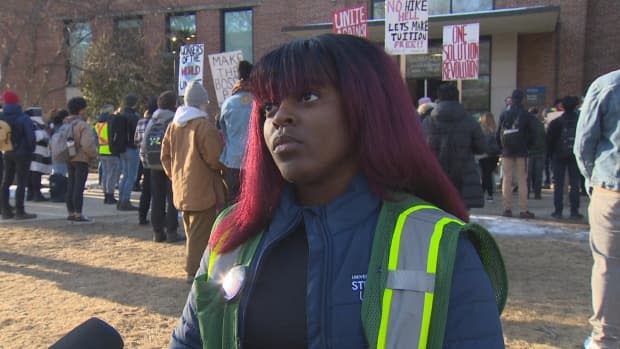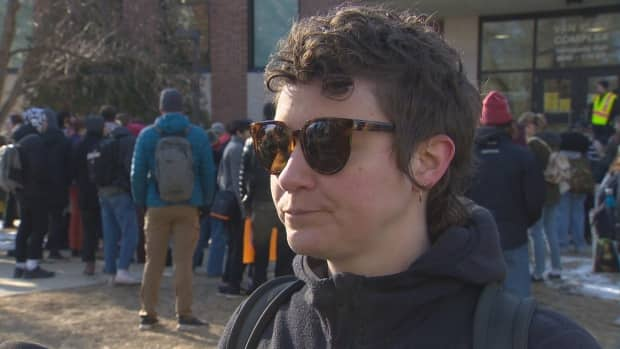U of A approves tuition hikes despite student protests

Disappointment and outrage were felt by students at the University of Alberta as the school's board of governors voted to hike tuition for students for the upcoming school year.
Student associations protested outside the board's office on Friday morning as a vote was held on proposed tuition increases. Domestic students will see their tuition increase by 5.5 per cent and international students will see an increase of 6.5 per cent for 2023-24.
Canada's inflation rate decreased to 5.2 per cent in February according to Statistics Canada, from 5.9 per cent in January.
Joannie Fogue, vice-president of student life with the students' union, said the hikes will further drive students into financial precarity.
"Students who are currently using the campus food bank, we're going to see more client food bank numbers going up and students facing food insecurity, as well as we've also seen a rising number in students facing homelessness, and that's just simply not okay," Fogue said in an interview as she protested the hikes.

Starting in 2024-25, universities, colleges and other post-secondary institutions can't hike domestic student tuition by more than two per cent annually, Advanced Education Minister Demetrios Nicolaides said during an announcement at the university in mid-February.
"The admission rates and the graduation rates for Indigenous students specifically, are already really low, and then any more economic deterrents are just going to lower those even further," Jillian Ames, president of the Indigenous Graduate Students Association said.
"I, myself am a parent and having to pay rent and pay for daycare ... they're trying to pull blood from a stone," Ames said.
Melissa Padfield, deputy provost of students and enrolment, said the tuition increases will go toward funding student financial aid as well as instructor salaries, creation and maintenance of classrooms and study spaces, utilities, research enterprise and school libraries.
Padfield said the breakdown of how much tuition goes toward instructor salaries is dependent on program enrolment.
"We don't actually dedicate a particular percentage toward salaries because the cost of program delivery varies between different types of programs," Padfield said.

She added following the tuition increases an additional $2 million will be going into non-repayable student aid, that will be for bursaries and access initiatives for students.
"Approximately three per cent of our student population receives financial support through our bursary program, and that's 100 per cent of eligible students," Padfield said.
"So every student that was eligible for financial support that came to us received financial support."
A portion of the previously approved 2023-24 tuition increases will also continue to fund the university's student financial aid: 15 per cent of domestic tuition increases and 7.55 per cent of total international tuition.
The Association of Academic Staff of the University of Alberta released a statement of solidarity and called on the province to intervene by properly funding post-secondary education.
"With the government slashing funding for universities over the past few years — including over $222 million in funding cut from the University of Alberta alone — students have increasingly been forced to make up the difference," Gordon Swaters, association president said.
"Headed into an election, we can speak up for advanced education's indispensability to our province, our economy, and our society. Together, we can show the government that we are not willing to sacrifice workers, students, or the future of our university at the hands of austerity."
In a statement to CBC, the Ministry of Advanced Education noted for 2023-24, the base funding for all 26 publicly funded post-secondary institutions is $1.8 billion.
"This is actually a $530,000 increase from 2022-23. Base funding for the University of Alberta was the same for both 2022-23 and 2023-24 at $436.6 million," spokesperson McKenzie Kibler said.
When asked if the province supports the U of A's tuition increase Kibler noted, "We heard from post-secondary institutions that bringing in a cap right away would have detrimental impacts to their current budgets. Bringing the tuition cap forward for 2024-25 helps post-secondary institutions plan ahead while also providing students with the predictable and stable tuition they've been asking for."
No tuition cap for international students
But for international students like Roman Bukatiuk, the future is uncertain as there remains no cap on international tuition.
"This is like around $1,100 more from what I have to pay for my studies," Bukatiuk, who moved to Edmonton a year ago from Ukraine, said.
"If you don't have rich parents, it means that you cannot study and this is for me so ridiculous for such a developed country."
Kibler addressed this by saying, "while we do not regulate international student tuition, in a student's offer of admission, institutions are required to inform international students of tuition costs for each year of their studies, which is guaranteed for the regular duration of that program."


